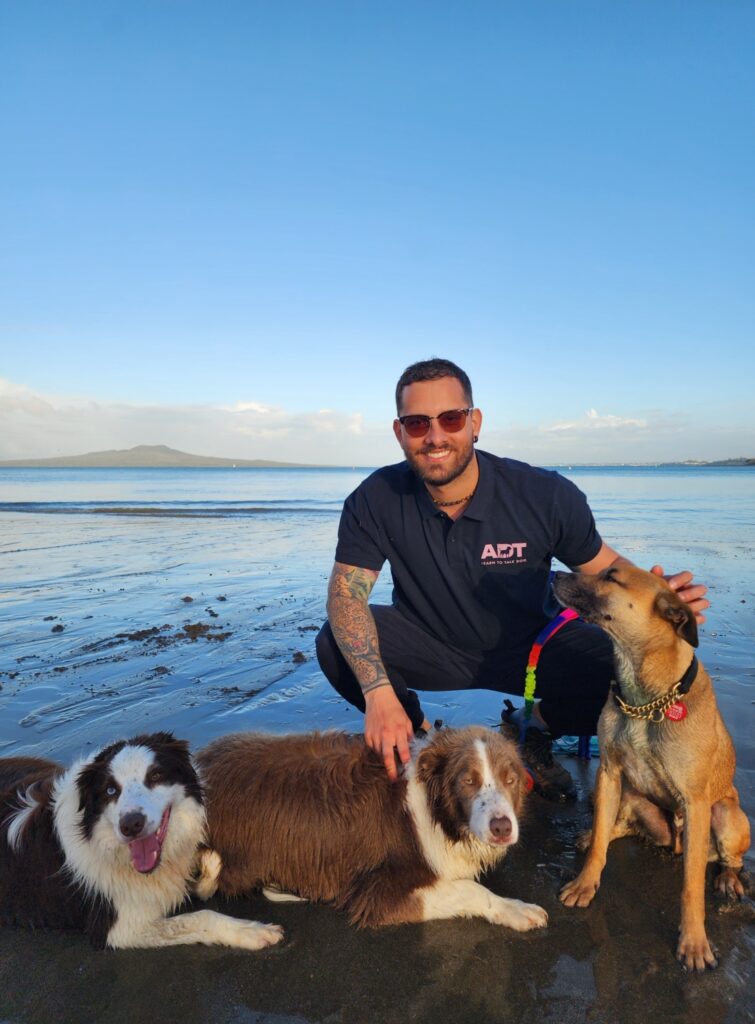🐾 Meet Fred – The Hooman Behind Auckland Dog Trainer 🐾
Hi, I’m Fred, dog trainer, philosophy nerd, Dad, rock climber, sailor, teacher and dog lover through and through.
I really value capability and have had an eclectic background including librarian, bike man, professional salsa dancer and high-school teacher. I believe in learning to do everything yourself. All of these experiences add a string to my bow as a dog trainer.
Before I found myself standing in dog parks, I was in classrooms teaching philosophy at a prestigious high school in my home country Colombia. That role taught me how to make the complex feel simple and relatable. I also love an analogy!
After stepping away from education and while renovating our first home here in Auckland, I found myself isolated and feeling a bit down. My Kiwi wife Sarah suggested I find a part-time job to break up the renovation work. That’s when I stumbled into a role as a pack walker. I found myself surrounded by dogs of all sizes and temperaments. Like having a relief teacher, the dogs at first sniffed out my inexperience and gave me a hard time. So with hours in the car everyday dropping them off I educated myself using the world’s best dog trainers and then trialling different methods on the packs I was handling to see what worked and what didn’t.
I quickly became a senior handler, and started mentoring new staff while developing my own training approach, one that blends psychology principles and dog’s natural communication. I realised dog training wasn’t just about the dog. It was about teaching humans HOW TO TALK DOG.
Now, through Auckland Dog Trainer, I bring together everything I’ve learned, from education, behavior science, and real-world handling experience, to help owners and their dogs thrive together. My work is driven by patience, precision, and a deep belief that every dog can be a good dog.
Sometimes, all it takes is someone to help translate what needs to be said.
When I’m not working, you’ll find me bouldering, paddleboarding or at home with my wife and baby daughter – my world outside of dogs. 🐾❤️

Balanced training
Balanced training is my ethos and the guiding framework of my practice, but to understand it fully, we also need to look at how humans and dogs experience the world differently. We live in the realm of the semantic [words, concepts, and abstract meaning] while dogs live in the realm of the concrete, rooted in body language and immediate experiences. Expecting them to rise to our level of complexity is, in my view, unfair. Instead, I invite owners to step into their dog’s world: to learn to read and identify their behaviors, body signals, and natural ways of communicating. By meeting dogs where they are, we can establish clearer, more effective communication in ways they actually understand.
To do this, I focus not only on decoding canine body language but also on applying learning principles rooted in psychology. For example, I often use free shaping, allowing dogs to explore and discover the desired behavior through the environment, guided by positive reinforcement. This approach gives the dog a sense of agency while also building clarity and confidence in training.
Balanced Dog Training, at its core, is built on the science of operant conditioning, the way behaviors are influenced by their consequences. Unlike methods that rely solely on rewards or solely on punishment, balanced training makes thoughtful use of all four quadrants of operant conditioning:
- Positive reinforcement (adding something pleasant to increase behavior),
- Negative punishment (removing something valued to reduce behavior),
- Negative reinforcement (relieving pressure when the correct response is given), and
- Positive punishment (applied fairly and minimally to reduce unsafe or undesirable behaviors).
The emphasis is always on positive reinforcement first and foremost, with any corrections used sparingly and under the principle of Least Invasive, Minimally Aversive (LIMA). By combining the motivational power of rewards with the clarity of fair boundaries, balanced training provides a complete communication system. It not only helps dogs perform reliably and safely, but also deepens mutual trust and creates lasting communication between dog and owner.
